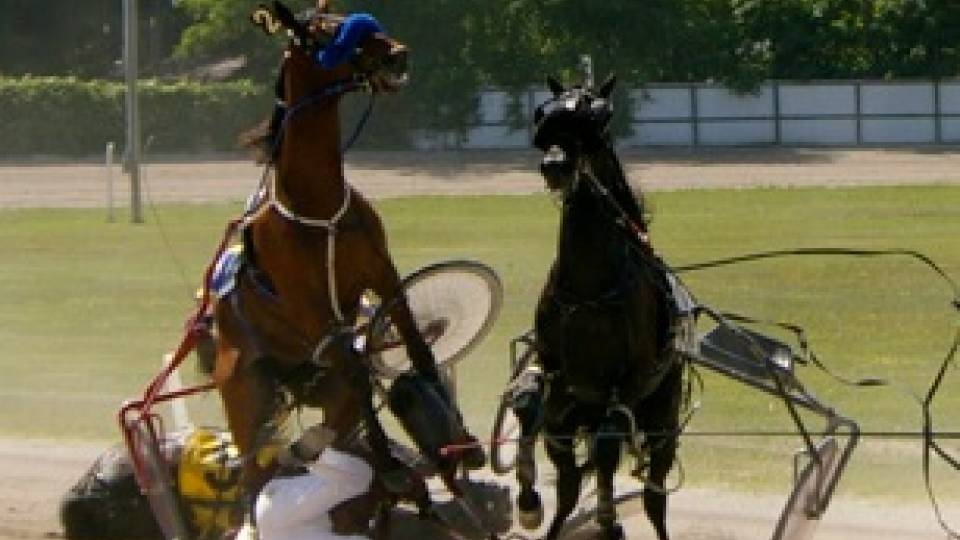Support MFOA’s work to expose cruelty in the harness racing industry
Sibal is a beautiful, two-year-old filly. She is a Standardbred, the breed used by the harness racing industry. Even though her immature body is vulnerable to injury, Sibal will be forced into training. She may spend up to 22 hours a day in a stall, be whipped repeatedly when racing, kicked and beaten after races, and injected with pain blockers or drugs to enhance performance.
After a short career, often only four or five years, she could be sold at auction, crammed onto a truck, and taken on a traumatic journey to a slaughterhouse in Quebec, where she will meet a terrifying end.
Sibal’s story is a sad, but common, scenario for harness-racing horses in Maine. We need you to help us take a stand on this outdated and inhumane activity, which is driven solely by money.
Anti-slaughter bill exposed industry’s dirty secrets
Earlier this year, Maine Friends of Animals submitted legislation to end the transportation of horses from and through Maine to slaughterhouses in Quebec. (Horse slaughter has been illegal within the U.S. since 2007.) Unfortunately, our bill was withdrawn after heavy lobbying by the Maine Harness Horsemen’s Association, the Farm Bureau and House Republican leadership.
MFOA was disappointed, but our research on the bill uncovered ugly realities about the lives of harness- racing horses in Maine. With your help, we can put a true face on the racing business. It is long overdue.
Please lend us your support by sending a donation today. We must have the funds to take on an industry that pays a professional lobbyist and PR agency to maintain its glossy public image.
A life of hardship and uncertainty
According to harness-racing insiders deeply familiar with the industry’s practices:
- Drugging horses to enhance performance or to allow an injured animal to race is common practice, but there is not sufficient oversight to stop it.
- Harness-racing horses are forced to train before bone growth plates have matured, so they suffer frequent injuries.
- Horses are often kept in stalls as long as 22 hours a day, standing in their own urine and feces.
- Excessive whipping, which causes welts and/or brings blood to horses’ faces, is prevalent and repeated. Fines are minimal and considered a cost of doing business. Repeat offenders are not suspended, but simply fined again.
- The Maine Harness Racing Commission that purportedly oversees and regulates the industry does not act as an objective, independent regulatory agent, but serves the industry’s interests. Commissioners are actually trained by industry representatives.
The industry contributes to Maine’s crisis of unwanted horses
Standardbred breeders, whose aim is to continually produce new winners for Maine’s harness-racing tracks, are escalating the crisis of unwanted horses. More off-the-track Standardbred horses are in need of rescue in Maine than any other type of horse.
The majority of horses bred for the track are not winners. Even successful racers usually have short careers. These animals can live up to 30 years or more. What happens to them?
Without enough humane retirement options, many are sold to the highest bidder and sent to Quebec’s slaughterhouses. The entire process-the auction, methods of transportation, feedlots, slaughter plants and slaughter methods-is inhumane.
Harness racing is a dying industry, subsidized by casino revenue
Like greyhound racing, which was exposed for its excessive cruelty, harness racing is a dying industry. Over the last decade, there have been precipitous declines in racing audiences and the money waged on harness races. Nevertheless, the state funnels millions of taxpayer dollars from slots revenue to racing tracks each year. Without this massive subsidy, harness racing could not survive. These millions could be directed toward economic development, education, or other worthy services.
Help us take on these vested interests!
MFOA is willing to take on this outdated and inhumane form of entertainment, but we need resources to do it. With your support, we can pull back the curtain and expose the industry for what it is-a miserable life for horses, a business left to regulate itself and a significant cause of horse slaughter.
Together we can bring change and make a difference for this magnificent animal that has served us in so many ways, for so long, so well and so nobly. Please make your contribution today . Thank you so very much!
January 2, 2013


